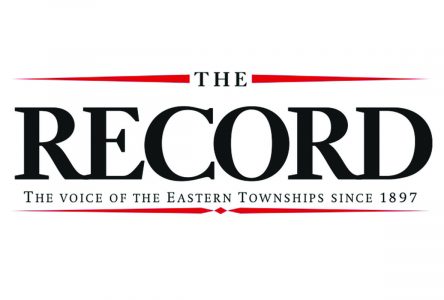By Nick Fonda
Local Journalism Initiative
Waste—human waste—is a problem.
The problem was addressed at a Monday morning press conference at the Municipality of Cleveland Town Hall when the director general, Martin Lessard, made public the municipality’s recommendations to the provincial government which is preparing legislation to regulate the storing and spreading of sewage sludge, also referred to as biosolids and as fertilizing residual material (FRM).
In addition to Martin Lessard, three other people spoke: Herman Herbers, mayor of Cleveland, Pascal Goux, a retired engineer and Cleveland resident, and Louis Robert, a retired agronomist and author of Pour le bien de la terre, a book that outlines the harm being done to agricultural land by the overuse of fertilizers and pesticides.
All towns and cities on the St. Francis River now have water filtration plants. Municipal waste water from the town’s sewer system flows to the filtration plant. There the water is aerated in ponds where the solids sink to the bottom and the water—now clean—is pumped back into the river.
Over time, the sediment in the settling ponds accumulates. Periodically, the pond is drained and the sediment dries into sludge which is transported to farms where it is spread over the fields like fertilizer.
Human waste is not very different to the waste produced by livestock, and it has been used the same way since the advent of agriculture.
More recently, that simple, natural cycle has become more complicated. As well as waste from residential neighbourhoods, filtration plants also have waste from commercial and industrial concerns. Inevitably, the process of fabricating household or other goods creates waste. Often, to varying degrees, the waste is toxic.
On a number of occasions, including in Cleveland in 2020, the dumping of toxic waste on agricultural land has resulted in people being poisoned, livestock stricken, and wells contaminated.
So far, the Quebec government has had guidelines to try to control where municipal and industrial sludge is spread. To prepare laws, rather than just guidelines, to regulate the sludge market, the government released a management code for fertilizing residual matter and gave interested parties a relatively small window of time to offer feedback and input into the drafting of the legislation.
Martin Lessard headed a group that prepared a detailed commentary focussed on the environmental impact of the management code, a text that is 91 pages long and was published in the Gazette Officielle du Québec on July 24, 2024.
High on the list of concerns were the timing and time-line set out by the government’s consultation process. Those wishing to suggest changes had 45 days to make their proposals. Worse, the government issued their request at a time when many are on vacation, and likely to miss the government’s announcement.
Subscribe to read the full storyThe proposed changes presented by Cleveland ran to 14 legal-sized pages. What follows are selected highlights.





